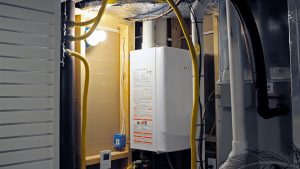Here at Plumb Smart, we often hear the same question from customers thinking about replacing their water heaters: is it worth it to get a tankless water heater? Unfortunately, this question is a bit too complex to answer with a simple “yes” or “no.” In this article, we’ll take a look at some of the pros and cons of tankless water heaters–so you can make your own informed decision.
How Does a Tankless Water Heater Work?
Unlike a traditional water heater, which stores and then heats cold water before dispersing it, a tankless water heater works on demand. That means that until you open up a hot water tap somewhere in your house, the unit remains in standby mode. When you open that hot line, the water heater fires up and heats the cold water as it passes through its heating coils, providing you with hot water as long as you need it. With that in mind, let’s dive in.
Eco-Friendliness
One of the first things most people think about when it comes to tankless water heaters is the issue of efficiency. A traditional water heater first fills completely up with cold water and then heats it to be ready when you need it. When not in use, it will periodically fire up to maintain its stored water at the correct temperature. Since a tankless water heater doesn’t store water and only turns on when you need it, you completely avoid these standby energy costs.
According to the US Department of Energy, a tankless water heater will cut your energy use by 8-34%, depending on how much hot water you use per day (the more you use, the closer your energy consumption gets to that of a traditional heater).
If you’re trying to make your home as green as possible, a tankless water heater is the clear winner.
Cost
Here’s where things get tricky. While tankless heaters are definitely more energy efficient than traditional ones, it’s unlikely that you’ll actually end up cutting overall costs through those energy savings. If you use Plumb Smart to install a standard 50-gallon water heater, your total cost will be between $1500 and $1600 for the unit and the installation, and it’ll last 10-15 years.
A tankless unit, on the other hand, will cost around $3000 for the unit and installation at minimum. And, since tankless water heaters require a higher-volume gas line and use different venting than traditional ones, you could be looking at several hundred to a couple thousand dollars in retrofitting costs upfront. Tankless units do last longer (about 20 years WITH proper maintenance), but even with top energy savings (around $100 a year), it would take you at least 15 years just to break even.
If you’re trying to save money, buy a traditional water heater.
Hot Water Availability
A major selling point of tankless water heaters is that you’ll never run out of hot water. No tank means no depletion, which means if you want you could run hot water all day long. This is great for filling a garden tub or taking a long, relaxing shower. However, the unit can only heat so much water at a time. A good one puts out around 5 gallons per minute; most bathtubs will use all of that, while a shower will run about 2-3 GPM. If you use multiple fixtures at once, you’ll still have hot water, but you may lose pressure. Of course, with a traditional unit, you still have a limited amount of hot water available at a given time.
Also, note that “on-demand” hot water does not mean instant hot water–once heated, the water still has to travel the distance from the unit to the fixture before reaching you. The only way to get instant hot water on any system is through the use of a circulating pump, which is an option on higher-end tankless models or can be added to any system separately.
Bottom line: you’ll never run out of hot water, but if your household generally uses multiple hot fixtures at once, a tankless unit may not be right for you.
In the end, it really just matters what your personal priorities are. A tankless water heater may not save you money, but it does have certain benefits that may outweigh that aspect for you. You could also consider using smaller tankless units for individual fixtures (like a garden tub), which are much cheaper and work right along with your existing water heater.
Schedule a Plumber
Schedule a plumber if you need assistance, we are happy to help.
Read our reviews to learn more about us or our services.

